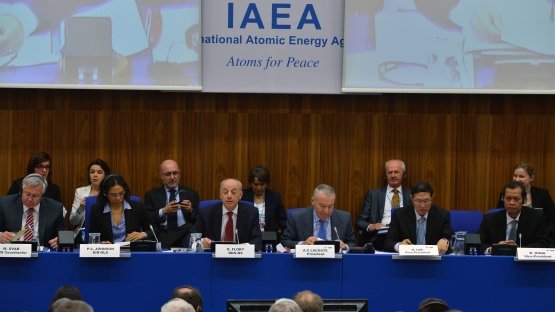The Sixth Review Meeting of the Contracting Parties (CPs) to the Convention on Nuclear Safety (CNS) commenced at the IAEA Headquarters in Vienna on Monday, 24 March 2014. For the next two weeks (24 March to 4 April 2014), the Contracting Parties to the Convention on Nuclear Safety will report on the implementation of their obligations under the Convention and will discuss how to improve nuclear safety worldwide through a constructive exchange of views.
In welcoming the delegates to the meeting, Denis Flory, IAEA Deputy Director General and Head of the Department of Nuclear Safety and Security, mentioned the challenges that the nuclear power industry faced soon after the earthquake and tsunami that damaged the TEPCO Fukushima Daiichi Nuclear Power Plant (NPP) in March 2011. He emphasized the importance of protecting NPPs from such external hazards and in this context, stated that significant progress has been made to further strengthen nuclear safety, emergency preparedness and radiation protection globally within the last three years.
Deputy Director General Flory also drew attention to IAEA's contributions to enhancing nuclear safety. These included the endorsement of the Action Plan on Nuclear Safety by the IAEA General Conference in 2011; enhancing the IAEA peer reviews; reviewing and revising the IAEA Safety Standards; and strengthening the international Legal Framework. He highlighted the importance of the Review Meetings of the CNS, and stressed that the 6th Review Meeting would demonstrate the commitment of Contracting Parties to further strengthen the effectiveness of the Convention and to reinforce nuclear safety.
In his statement to the delegates, André-Claude Lacoste, former Chairman of the French Nuclear Safety Authority (ASN) and President of the 6th Review Meeting of the Convention on Nuclear Safety, shared his expectations for the Review Meeting, i.e. to achieve three main objectives, namely:
- To allow wide-ranging, animated, high-quality discussions, with real commitment by all Contracting Parties, so that it is a true peer review, where all learn from the others;
- To improve the mechanisms of the Convention and to strengthen its effectiveness; and
- To adopt a stance on the lessons to be learned from this accident, with a clear statement at the end of this Review Meeting.
Almost all countries with operating nuclear power plants are Contracting Parties (CPs) to the CNS. Being a CP to the CNS implies the two following commitments: to prepare and make available a National Report on the entire national nuclear safety regime for review; and, to subject its National Report to a Peer Review by the other CPs. During the first week of the Review Meeting, CPs are expected to deliver their respective national presentation, leading to discussion within each Country Group.
Each day of the second week of the Review Meeting will be devoted to a specific item: the Rapporteurs' Reports, a Fukushima session - during which there will be a report on the results of the discussions held during the Country Group sessions related to actions carried out by CPs in the light of the Fukushima Daiichi accident, the presentation of the Open-Ended Working Group (OEWG) Report, a discussion on the formal proposal by Switzerland to amend the Convention, and finally the approval of the Summary Report and the acceptance of the President's Report.
The final news conference is on the last day of the Review Meeting, 4 April 2014, details of which can be found here.
More information on CNS, including links to national reports from Contracting Parties that have chosen to make them public, is available here.
Background
The Convention, which entered into force on 24 October 1996, was designed to enhance nuclear safety. Its objectives are to achieve and maintain a high level of nuclear safety worldwide, to establish and maintain effective defenses in nuclear installations against potential radiological hazards, and to prevent accidents having radiological consequences.
Countries that are parties to the Convention have committed to report on the implementation of their obligations, with the reports being reviewed by participants in meetings held every three years.
An extraordinary meeting was held in 2012 to review and discuss lessons learned from the March 2011 accident at TEPCO's Fukushima Daiichi Nuclear Power Station and to review the effectiveness of the provisions of the Convention.
The Convention on Nuclear Safety is an incentive instrument. It does not compel Parties to adhere to certain safety standards, but is, instead, based on their common interest to achieve a high level of safety.
The IAEA Director General is the depositary for the Convention and the IAEA acts as the secretariat for the Review Meetings by convening, preparing and servicing these meetings, as well as transmitting relevant information to the Contracting Parties.


